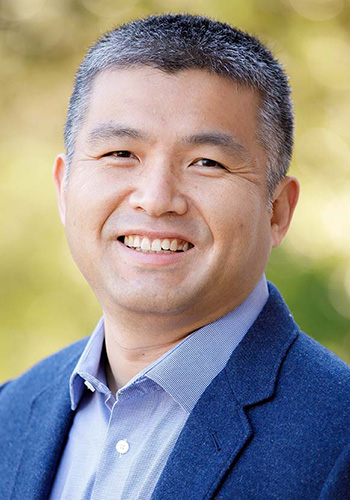
Dr. Myoungkyu Lee
Assistant Professor of Mechanical & Aerospace EngineeringOffice Location N236 Engineering Building 1
Phone 713-743-3536
Email leemk [at] uh.edu
Website https://lee.me.uh.edu
Education
Ph.D. – Mechanical Engineering, University of Texas at Austin, 2015
B.S. – Mechanical Engineering, Hanyang University, 2008
Professional Experience
Scientific Advisory Committee, International Symposium on Turbulence and Shear Flow Phenomena, 2023 – Current
Assistant Professor, Department of Mechanical and Aerospace Engineering, University of Houston, 2023 – Current
Assistant Professor, Department of Aerospace and Engineering Mechanics, University of Alabama, 2022 – 2023
Postdoctoral Researcher, Sandia National Laboratories, 2018 – 2021
Postdoctoral Researcher, Oden Institute of Computational Science and Engineering, 2016 – 2018
Courses Taught
MECE 3363 Introduction to Fluid Dynamics
MECE 6397 Advanced Numerical Method for Mechanical Engineering
MECE 6397 Introduction to Computational Fluid Dynamics
Research Interests
Dr. Lee's research interests span various areas, including high-performance computing, flows involving thermal and chemical nonequilibrium, and direct numerical simulations of wall-bounded turbulent flows with multiphysics phenomena such as electromagnetism.
Awards & Honors
Early Career Presenter Fellowship, the U.S. National Committee for Theoretical and Applied Mechanics, 2021
Travel Award, Fluid Dynamics Software Infrastructure Workshop, The University of Colorado, Boulder, 2019
Best student paper finalist, SuperComputing, SC13, ACM, 2013
University Honor, The University of Texas at Austin, 2006
Sinyang Scholarship, Sinyang Cultural Foundation, 2005
University Scholarship, Hanyang University 2001
Selected Publications
- Baars, Dacome and Lee, “Reynolds-number scaling of wall-pressure–velocity correlations in wall-bounded turbulence,” 2024, Journal of Fluid Mechanics, 981, A15, https://doi.org/10.1017/jfm.2024.46
- Holford, Lee and Hwang, “A data-driven quasi-linear approximation for turbulent channel flow,” 2024, Journal of Fluid Mechanics, 980, A12, https://doi.org/10.1017/jfm.2023.1073
- Holford, Lee and Hwang, “Optimal white-noise stochastic forcing for linear models of turbulent channel flow,” 2023, Journal of Fluid Mechanics, 961, A32, https://doi.org/10.1017/jfm.2023.234
- Usher, Park, Lee, Navratil, Fussel and Pascucci, “A Simulation-Oblivious Data Transport Model for Flexible In Transit Visualization,” 2022, In In Situ Visualization for Computational Science, Springer, https://doi.org/10.1007/978-3-030-81627-8_18
- Neuroth, Rieth, Konduri, Lee, Chen and Ma, “Level Set Restricted Voronoi Tessellation for Large scale Spatial Statistical Analysis,” 2022, IEEE Transactions on Visualization and Computer Graphics, 29(1), 548-558, https://doi.org/10.1109/TVCG.2022.3209473
- Patel, Manickam, Trask, Wood, Lee, Tomas and Cyr, “Thermodynamically consistent physics-informed neural networks for hyperbolic systems,” 2022, Journal of Computational Physics, 449, 110754, https://doi.org/10.1016/j.jcp.2021.110754
- Deshpande, de Silva, Lee, Monty and Marusic, “Data-driven enhancement of coherent structure-based models for predicting instantaneous wall turbulence,” 2021, International Journal of Heat and Fluid Flow, 92, 108879, https://doi.org/10.1016/j.ijheatfluidflow.2021.108879
- Smits, Hultmark, Lee, Pirozzoli and Wu, “Reynolds stress scaling in the near-wall region of wall-bounded flows,” 2021, Journal of Fluid Mechanics, 926, A31, https://doi.org/10.1017/jfm.2021.736
- Bae and Lee, “Life-cycle of streaks in the buffer layer of wall-bounded turbulence,” 2021, Physical Review Fluids, 6(6), 064603, Editor’s Suggestion, https://doi.org/10.1103/PhysRevFluids.6.064603
- Yang, Hong, Lee and Huang, “Grid resolution requirement for resolving rare and high intensity wall-shear stress events in direct numerical simulations,” 2021, Physical Review Fluids, 6(5), 054603, Editor’s Suggestion, https://doi.org/10.1103/PhysRevFluids.6.054603
- Hwang and Lee, “The mean logarithm emerges with self-similar energy balance,” 2020, Journal of Fluid Mechanics, 903, R6, https://doi.org/10.1017/jfm.2020.730
- Lee and Moser, “Spectral analysis of the budget equation in turbulent channel flows at high Reynolds number,” 2019, Journal of Fluid Mechanics, 860, 886-938, https://doi.org/10.1017/jfm.2018.903
- Haering, Lee and Moser, “Resolution-induced anisotropy in LES,” 2019, Physical Review Fluids, 4(11), 114605, https://doi.org/10.1103/PhysRevFluids.4.114605
- Lee and Moser, “Extreme-scale motions in turbulent plane Couette flows,” 2018, Journal of Fluid Mechanics, 842, 128-145, https://doi.org/10.1017/jfm.2018.131
- Panton, Lee and Moser, “Correlation of pressure fluctuations in turbulent wall layers,” 2017, Physical Review Fluids, 2(9), 094604, https://doi.org/10.1103/PhysRevFluids.2.094604
- Malaya, McDougall, Simmons, Michoski and Lee, “Experiences Porting Scientific Applications to the Intel (KNL) Xeon Phi Platform,” 2017, In Proceedings of the Practice and Experience in Advanced Research Computing 2017 (PEARC’17) on Sustainability, Success and Impact. ACM, New Orleans, Louisiana, https://doi.org/10.1145/3093338.3093371
- Graham, Kanov, Yang, Lee, Malaya, Lalescu, Burns, Eyink, Szalay, Moser and Meneveau, “A Web services accessible database of turbulent channel flow and its use for testing a new integral wall model for LES,” 2016, Journal of Turbulence 17(2), 181-215, https://doi.org/10.1080/14685248.2015.1088656
- Lee and Moser, “Direct numerical simulation of turbulent channel flow up to Reτ =5200,” 2015, Journal of Fluid Mechanics 774, 395-415, https://doi.org/10.1017/jfm.2015.268
- Lee, Ulerich, Malaya and Moser, “Experiences from Leadership computing in Simulations of turbulent Fluid Flows,” 2014, Computing in Science & Engineering 16, 5, 24-31, https://doi.org/10.1109/MCSE.2014.51
- Lee, Malaya and Moser, “Petascale direct numerical simulation of turbulent channel flow on up to 786k cores,” 2013, In Proceedings of SC13: International Conference for High Performance Computing, Networking, Storage and Analysis. ACM, Denver, Colorado, Best student paper finalist, https://doi.org/10.1145/2503210.2503298